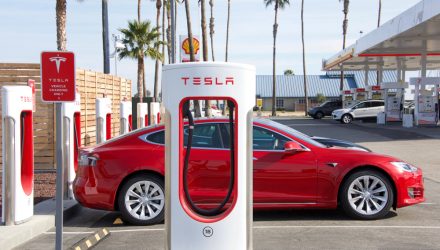Tesla-heavy ETFs, including the ARK Autonomous Technology & Robotics ETF (CBOE: ARKQ), could be poised to rally on news coming from the electric vehicle maker’s upcoming Battery Day.
Wall Street is expecting big things from Elon Musk’s company on the Sept. 22 Battery Day, including updates on battery manufacturing and production efficiency. Adam Jonas, Morgan Stanley’s auto analyst, says the event could be a narrative changer for Tesla, which is ARKQ’s largest holding.
“Morgan Stanley estimates that Tesla is on track to produce 439 GwH of batteries through in-house production and third party supply by 2030, which is roughly 26% of global EV battery market share,” reports Pippa Stevens for CNBC.
Big Battery Day Opportunity
ARKQ seeks long-term growth of capital. The fund is an actively-managed fund that will invest under normal circumstances primarily in domestic and foreign equity securities of autonomous technology and robotics companies that are relevant to the fund’s investment theme of disruptive innovation. Most of the fund’s assets will be invested in equity securities, including common stocks, partnership interests, business trust shares, and other equity investments or ownership interests in business enterprises.
If Tesla can provide positive updates on battery costs and range, that could result in an epic move for the shares.
“Jonas is also expecting updates on the cost of batteries as well as their range, both of which are important for electric vehicles to take market share from traditional internal combustion engine cars,” according to CNBC.
Lithium-ion battery capacity is vital because one of the primary factors car buyers consider when evaluating electric vehicles is how long those vehicles can run on a single charge.
“The prevailing view is that battery cell cost can decline at a compound rate of 6 to 7% from just over a $100/KwH level today,” Jonas said Friday in a note to clients. “Could Tesla communicate plans to potentially double this rate of deflation or to target $50/KwH or less by mid or latter this decade due to the additive/compounding effects of their process efficiencies, scale, and energy density improvements?
Electric vehicles are in the early innings of development and there are signs that there is a lot of pent up demand among consumers who want to embrace the technology. In 2017, electric vehicle sales represented 1.7% of all vehicle sales globally, exceeding 1 million for the first time and rising 51% year-over-year. The rate could continue to accelerate as a result of EVs becoming more economical than gas-powered cars and as a result of pro-climate regulatory changes pushing to ban gas-powered cars.
For more on disruptive technologies, visit our Disruptive Technology Channel.
The opinions and forecasts expressed herein are solely those of Tom Lydon, and may not actually come to pass. Information on this site should not be used or construed as an offer to sell, a solicitation of an offer to buy, or a recommendation for any product.

